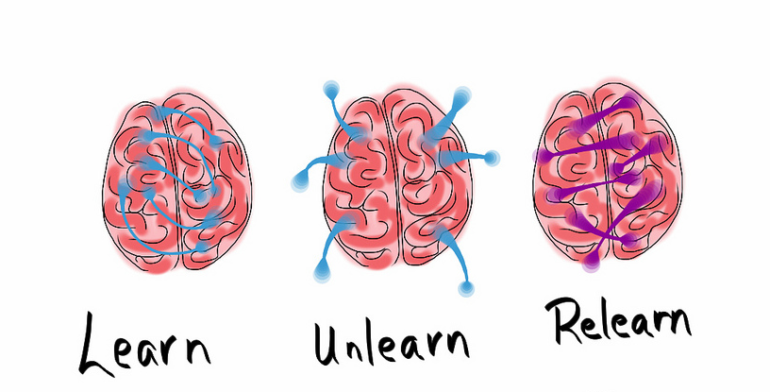Unlearning is one of the most important things we can do in life. Unlearning allows us to evolve and adapt to new ideas and be more open.
Unlearning is the process through which we break down the origins of our thoughts, attitudes, behaviors, feelings, and biases.
To build a more authentic and clear path within our lives, we must ask ourselves, where do my beliefs come from? Do my beliefs support my mental and physical health? And lastly, do my beliefs align with the life I want and who I want to be?
These aren’t easy questions to ask ourselves, but they are vital to reframing what we once thought we knew.
We must strip away our beliefs, acts, and behaviors that have been imposed by our upbringing, education, and society.
Unlearning forces us to challenge the ways we were taught to think and embrace the way things are changing. Change is a scary thing, but it’s also one of the most beautiful parts of life and the only way we will ever truly be able to make a difference.
Everything we know today, we learned at some point in our lives. And while unlearning can be difficult, we should all commit to unlearning. If we focus on unlearning the ideas we were once taught we will be able to adapt and be more open minded.
To unlearn doesn’t mean to forget what we know; it simply means to alter it to the world’s new ideas.
According to Nancy Michael, a Professor of Neuroscience at the University of Notre Dame, “Unlearning takes maturity, discipline, and equal parts courage and humility. Unlearning is neither forgetting nor removing old information, experiences, or ways of thinking; instead, it is building new patterns of synaptic communication that can support different ways of thinking.”
For example, we once learned that “a woman should remain at home, in the kitchen, and not working.” This idea is now completely outdated, times and customs have changed, and women are now prominent fixtures in the workforce. We must unlearn this way of thinking to effectively and respectfully work alongside a woman in the workplace, thus helping to ultimately destroy the wage gap, providing women with equality in the workplace.
Unlearning is also essential when it comes to biases. Researchers at the Ohio State University’s Kirwan Institute for the Study of Race and Ethnicity note several features of implicit bias: “Implicit biases are pervasive. Everyone possesses them, even people with avowed commitments to impartiality, such as judges. Implicit and explicit biases are related but distinct mental constructs. They are not mutually exclusive and may even reinforce each other. The implicit associations we hold do not necessarily align with our declared beliefs or even reflect the stances we would explicitly endorse. Implicit biases are malleable. Our brains are incredibly complex, and the implicit associations that we have formed can be gradually unlearned through a variety of ‘debiasing techniques .”
Unlearning hate is another crucial aspect of the unlearning process. It’s not human nature to hate; hatred is learned. We are all born with the ability and capacity for hate as well as love and compassion. Which side we decide to embrace depends on our upbringing. It requires mindful choices influenced by our families, communities, friends, and our cultures.
The key to overcoming hate is education; at home, in schools, and in our communities.
According to Silvia Dutchevici, LCSW, president and founder of the Critical Therapy Center, facing the fear of being vulnerable and utterly human is what allows us to connect, to feel, and ultimately, to love. She suggests creating “cracks in the system.” These cracks can be as simple as connecting to your neighbor, talking with a friend, starting a protest, or even going to therapy and connecting with another. It is through these acts that we can understand love and.
Many beliefs have been imposed upon us throughout our lives that shape the ways we live and our relationships. A few beliefs we can begin to unlearn are, “Money is the key to happiness.” “Never take ‘no’ for an answer.” “College is necessary for success.” “Adults are always right.”
The power of unlearning relies on our ability to transform & change.
We have the power to change the world, but first, we must change the way we think.
To unlearn, we must read, observe, listen, study and retain. Once we do this, we must hold ourselves accountable for the knowledge we are taking in and understand that change is the key to unlearning.


